Tv Is Better Than Ever Before but It Isnt Art
Cardinal TAKEAWAYS:
- Television is America'southward national pastime. Adults spend an average of nearly three hours in front of the tube daily, outpacing the next most common leisure-time activeness past a factor of four.
- There is surprisingly robust prove suggesting TV watching may contribute to poor physical and cognitive health; when it comes to happiness and life satisfaction, however, the verdict is still out.
- Are people consciously choosing Television receiver over other activities? There'southward not a lot of evidence one way or another, but it doesn't seem similar most adults who watch large amounts of Idiot box are doing so reluctantly.
- The arts are non the (obvious) antidote. People who attend exhibits and performances are no more than likely to report existence satisfied with their lives than those who don't.
- We value adults' liberty to make their ain choices, so will demand to come across clearer evidence for an opportunity to improve wellbeing before committing to a case for change.
* * *
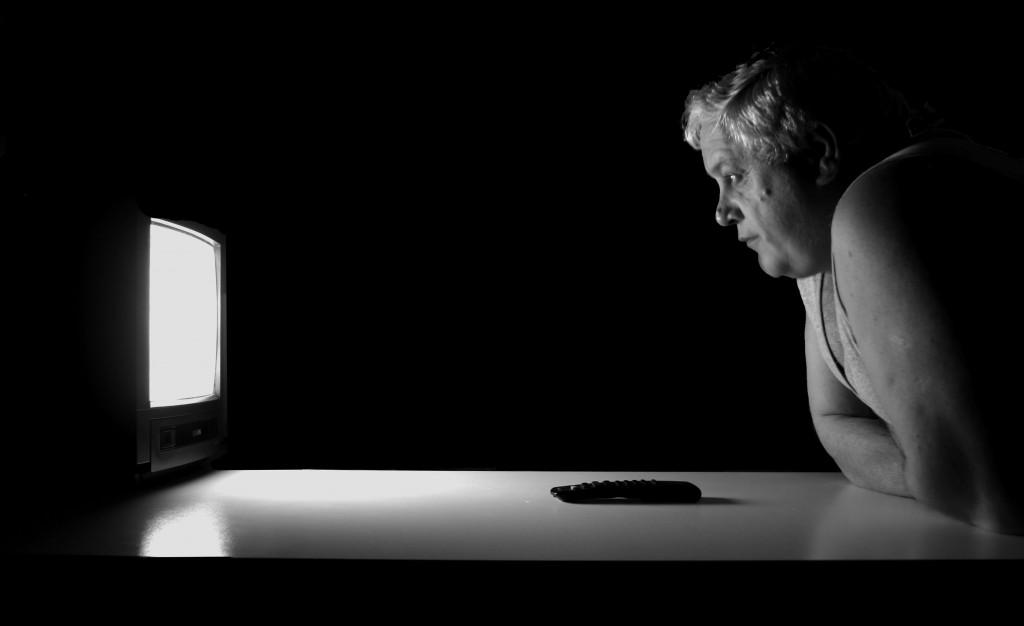
Boob tube Slave – photo by flickr user Manuele Carra
In 2014, Outset Lady Michelle Obama broke the cyberspace with "Turnip for What," a vine promo for her Allow's Move! campaign. She's appeared on the Biggest Loser. She has her own viral dance sensation–the #GimmeFive, performed to Marker Ronson'south Uptown Funk. (You lot know it, right?) And she's encouraging Americans to beverage more than water through fun social media stunts that appeal to our egos (hello, John Legend) and a line of chic accessories from the likes of J. Crew and Rebecca Minkoff. (Non to be outdone, POTUS and VPOTUS accept been known to run effectually the White House and potable h2o, too.)
No, she's not trying to be the next pop star. (Though nosotros would totally buy her record.) She has a mission, and that's to stem the obesity epidemic in the United States. The situation is, by all accounts, dire: 17% of children and almost 35% of adults are currently considered obese, and those numbers are worse amongst individuals with lower incomes and less education (and so-chosen "low-SES" populations). Almost one in eleven adults has type two diabetes, and many more have prediabetes. Obesity is bad for our wallet: the US spends an estimated $147 billion in obesity-related healthcare expenses annually. It's bad for the environment, too: cars are burning nearly a billion more gallons of gasoline a yr than if passengers weighed what they did in 1960.
FLOTUS is but one character in the ongoing obesity saga. The Food and Drug Administration appeared in 2022 with new rules requiring establishments to post the calorie content of food on their menus. It went even farther in 2015, when information technology required front-of-bundle labeling. Former Mayor Mike Bloomberg led a movement in New York to reduce soda consumption past limiting the sale of colossal sugary drinks, which re-ignited the debate around the and so-called sin tax. For more than than a decade, public schools have battled youth junk food consumption with all sorts of methods: removing vending machines, imposing strict guidelines for school nutrition, and the Hail Mary move of banning birthday cupcakes.

Let'southward Motility Day – photograph past flickr user Phil Roeder
The junk food hullabaloo raises interesting questions about option, and whether individuals can or practise make good choices for themselves. Hither, the piece of work of leading psychologists, economists and neuroscientists provides useful context: it is now widely accepted that most people make sense of the globe by simplifying it, and the ways our brains are wired to simplify things tin can cause usa to make judgments that are contrary to our all-time interests. There are a few reasons we might tend towards the simplify trap: hyperbolic discounting, which is our tendency to value immediate pleasure (or hurting) over future consequences; loss disfavor, or the fact that we dislike losing more than than nosotros similar winning, which can make us gamble-averse; or our trend to focus simply on what we know and what'due south familiar. The combination of these factors makes low-take chances, familiar propositions offering immediate satisfaction very hard to turn downwardly. If nosotros grew upward with juice boxes and oreos every bit a school snack, and the closest grocer is a corner bodega stocked with fries and soda, and, well, sugar and table salt and fat are then expert, then of course we'd reach for cookies over carrots.
At this signal, dear reader, yous might be wondering why nosotros accept spent the outset four paragraphs of an commodity about boob tube and the arts talking about obesity. Well, as it turns out, Television (probably) makes you lot fat too.
TUNE IN, DROP OUT
Jamie One thousand. is a 36-yr-old from Fort Wayne, IN. She has a GED, and is unemployed. She likes to brand jewelry and work on habitation comeback projects in her gratis time, which isn't much, since she has iii teenagers. She doesn't get to arts events, because she doesn't "have friends that are cultured, and it'southward difficult to become to things that [she] would find interesting past [herself]." She actively watches 10 hours of Television receiver a day. Sonja B., a 57-twelvemonth-old from Chicago, IL who is also unemployed, doesn't attend arts events because they are usually in the evening, and she "wouldn't want to get by [herself.]" She works out, and watches an average of 15 hours of TV, daily. Shantell T. is a 33-twelvemonth-old authoritative assistant from Washington DC. She watches 12 hours of TV on a typical twenty-four hour period, and doesn't consider herself to be a very "artsy" person.
In May of 2015, Createquity published Why Don't They Come up?, the first of many deep dives into the question of disparities of access to the benefits of the arts. The article looked closely at arts participation patterns among poor and less educated individuals, and considered obstacles to attendance including logistical reasons, such as cost and access to transportation or childcare, likewise every bit other factors similar feeling excluded and not having a friend to accept forth. (It is worth noting that many of the logistical reasons cited as obstacles to arts attendance are barriers to healthy eating every bit well. Cost and access in particular are blamed with the widening food gap between rich and poor.)
What we discovered in the grade of our research surprised us. While the aforementioned obstacles were certainly barriers, a lack of explicit interest was far and away the dominant gene keeping low-SES populations abroad from arts events.
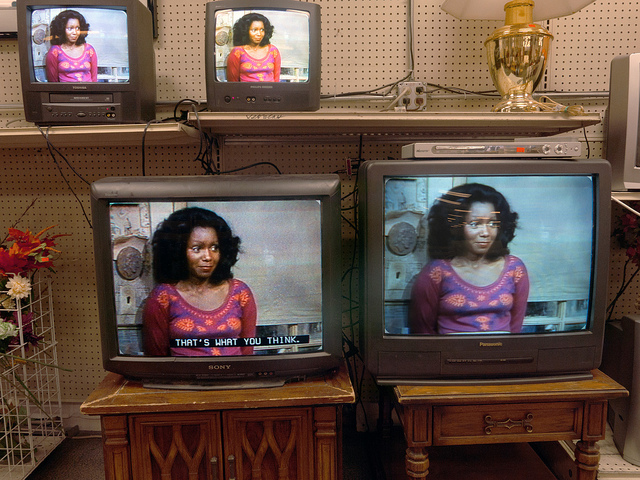
That's What You Retrieve – photograph by flickr user Robert Couse-Bakery
93% of Americans spend time in front of the tube on a typical 24-hour interval, and poor and less educated adults sentry more than most: they spend twice every bit much time consuming television set equally on all other leisure activities combined, outpacing the next most common activity (socializing) by a factor of iv.
This is not to say that depression-SES adults are not consuming cultural products. They are indeed consuming them in generous, mayhap even alarming, quantities–just in the form of television. Jamie, Sonja and Shantell are not solitary: 93% of Americans spend fourth dimension in front of the tube on a typical day, according to data from the 2012 Full general Social Survey (GSS). While most everyone watches boob tube, depression-SES adults spotter more than most. According to the Agency of Labor Statistics' American Fourth dimension Use Survey, individuals with less than a high school diploma spent 3.77 hours per weekday watching TV in 2013, almost double the TV hours consumed by those with a available's degree and higher. (Note 1) What's more, these individuals spent twice as much time consuming television every bit on all other leisure activities combined, outpacing the adjacent about common activity (socializing) by a gene of four. (You tin dig into more such statistics hither.)
Of all these statistics, one in item stood out to united states. Almost alone among the activities nosotros studied, television attracted more participation from poor and less educated adults rather than less. And on top of that, our analysis of GSS data suggested that fifty-fifty inside low-SES groups, adults who don't attend arts events watch even more Tv set than those who do. It seems possible that, whatever sustenance people are seeking from alive arts omnipresence, the folks who don't go are getting it (at to the lowest degree in role) from the small screen.
Adults who don't attend arts events picket fifty-fifty more Boob tube than those who do. We were curious: are people going to be worse off on average watching Idiot box instead of engaging in other, potentially more enriching, activities? Is there an opportunity here to improve wellbeing through the arts?
Television set has a lot going for it: it'south easier than e'er to watch what yous want without paying for cable, and content is increasingly available on-demand, on devices you lot likely already own. No one will judge know if you lot're rampage watching soaps solo, and with a whopping 409 original scripted telly serial available in the US in 2022 (hello, Tiptop TV), if you notwithstanding tin can't detect something you're interested in, then you probable never will. The numbers are not really that surprising: not one of the reasons interested non-attendees cited as obstacles to arts participation outside of the home seems to apply to television. In fact, there don't seem to be many obstacles to consuming idiot box at all.
Given the trend to be distrustful of tv, we were curious: are people going to be worse off on average watching TV instead of engaging in other, potentially more than enriching, activities? Should this be an area of concern for our work here at Createquity? Is there an opportunity here to improve wellbeing through the arts?
Modest SCREEN, BIG CONSEQUENCES
"It's kind of a waste," admits one of our interviewees. "I'k not really doing anything when I'k sitting and watching Tv set."
As information technology turns out, sitting and not actually doing anything when you lot're watching Idiot box doesn't bode well for your physical wellbeing. At that place is compelling evidence that increased hours spent watching television is associated with obesity, in part because of the sedentary lifestyle it promotes by crowding out time that could be spent on exercise. SA Bowman looked at data from the USDA's Continuing Survey of Food Intakes by Individuals (CSFII), and found that men and women across demographic groups, including race, income, and educational status, were more likely to be overweight as their average hours of boob tube viewing per day increased. Women who watched more than than 2 hours of Tv per day were 41.iv% more likely to be obese than women who sentry less than ane hour a day. For men, that figure was 90.29%. And it's not only sitting that'due south the problem: fifty-fifty among healthy Australian adults who exercise at to the lowest degree 2.5 hours per week, watching Television receiver is straight up bad for the waistline, with more than hours watching Television per mean solar day was associated with increased blood pressure, waistline, and cholesterol levels. (Note 2)
Enquiry has indicated that TV affects concrete wellness in other means too⏤even to the bespeak of shortening your lifespan. One squad's analysis of the 2008 General Social Survey-National Decease Alphabetize dataset reveals that each hour of TV watched per day is associated with a 4% increase in bloodshed risk, amounting to an overall reduction of ane.2 years in total life expectancy due to television viewing in the US. A 2010 paper found an increased likelihood of all causes of mortality with more than 2 hours of television receiver watched per day. Yet a third paper finds that, compounding psychological factors bated, Television receiver may lend itself to an increased likelihood of smoking (and nosotros all know where the shoe drops there).
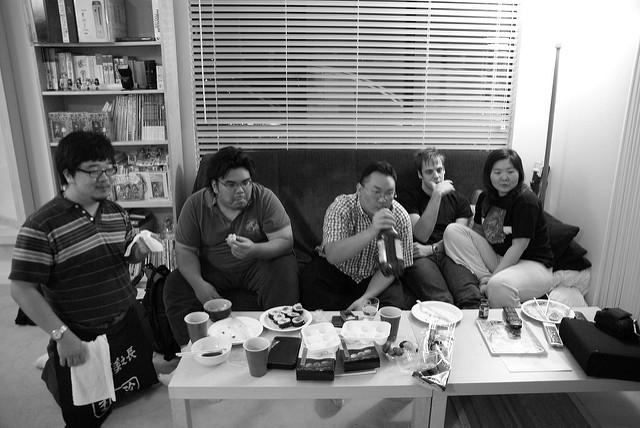
Watching Zoolander – photo by flickr user Vincent Diamante
One study institute that women who watched more than than two hours of TV per 24-hour interval were 41.four% more likely to exist obese than women who watch less than one hour a twenty-four hours. For men, that figure was 90.29%.
Spending pregnant time glued to the small screen is not just bad for your butt. Information technology'due south bad for your encephalon, too. Findings from a longitudinal study published in January 2022 suggest that watching television in early machismo is linked with poor cognitive performance in midlife. As they aged, individuals with both low levels of physical activity and who watched iii or more than hours of television per twenty-four hours were increasingly likely to perform poorly on cognitive tests, fifty-fifty subsequently taking demographic and health characteristics into account.
Are you doing some math in your caput? (Your Favorite TV Shows x Full Viewing Hours) / Hours Watched Daily = Life Expectancy Reduction and Loss of Noesis? Nosotros did some math too, because there'due south more to the brain than cognition. Nosotros ran a regression analysis on television and wellbeing using data from the 2012 Full general Social Survey. Afterwards controlling for variables including health, income level, educational activity level, gender, age, and the frequency with which people collaborate with their friends and relatives, we found that increased hours of watching television is negatively associated with overall life satisfaction for people in the top 3 income quartiles, admitting simply by a petty chip. (Interestingly, nosotros did not an association between goggle box viewing and happiness for people with household incomes less than $25,000 per year). With a pocket-size sample and effect size and no ability to infer the direction of causality, nosotros have to exist conscientious not to push these results too far. Nevertheless, this descriptive assay doesn't do the example for TV any favors.
Others have investigated the relationship betwixt watching a lot of television set and one's overall satisfaction with life (sometimes framed or referred to by scientists as subjective wellbeing). In their assay of individual responses to the World Values Survey, which includes data from eighty countries, researchers Luigino Bruni and Luca Stanca found that television "crowds out" other, more social, activities–such equally volunteering or spending time with friends and family unit–that are associated with higher life satisfaction. In the same study, they also suggest that increased hours spent watching television set causes people to want higher incomes, which in turn creates unhappiness and depression life satisfaction. Co-ordinate to Bruni and Stanca, TV is a role of a "relational treadmill" that induces people to measure their increase in happiness against that of their neighbors, instead of against their own experiences. Tv set, they argue, makes people want to consume more, inspired by both advertising and program content; unfortunately, by this metric, individuals volition never accomplish a real increment in happiness that corresponds to their increment in buying ability. Some have issue with the way Bruni and Stanca classified countries in their methodology (see hither), and at least one set of researchers note that when because heterogeneity within countries, people who sentinel television report higher levels of wellbeing than people who practise not watch whatever television at all. Nevertheless, we probable can all bespeak to an example of being sucked into the "relational treadmill" of consumption thanks to Tv.

Television and your brain: Turin street art – photo past flickr user mermaid
Two researchers plant that, across the countries, increased hours spent watching television is associated with unhappiness and low life satisfaction.
It'due south not just the quantity but also the quality and type of programming that may exist bad for subjective wellbeing. There is a significant body of research on whether and how viewers are directly affected by what they watch on television, and how that may inform the way that they recall about the world. Studies show that television can be associated with shaping political contests, purchasing behavior, or increases in aggression or fear of being victimized. In an investigation of how local news influences perceptions of the likelihood of high-risk events, one study across three unlike datasets establish that people who watched local news oft were more than likely to think that they were at chance of criminal victimization than people who watched less local news. Co-ordinate to media and communications professor Sonia Livingstone, television receiver has a profound issue on the manner that we perceive our everyday lives. She argues that the thought that people passively consume tv set without trying to make meaning of its contents is false, and that most viewers make deep connections to on-screen characters and stories that impact their daily realities. In her book Making Sense of Television, she draws on the literature of audience interpretation, psychology, and literary criticism to discuss how audience members form parasocial relationships with characters on the small screen. Given the prevalence of tv set in our lives, she notes that "psychologically it does non seem plausible that our assumptions, images, and knowledge of the world portrayed past television set can be strictly separated from our assumptions, images, and knowledge of everyday life."

THE TWIST
You would recollect with all this talk of obesity, mortality, and dissatisfaction with life, people would reach for the off push button. The fact that they don't suggests they must be getting something out of it.
Could it just exist that people who lookout large amounts of Idiot box lack self-control? That could explain some of these findings; for example, at that place is enquiry that indicates unhappy people in general tend to watch more TV, suggesting that depression might be the culprit in some cases. But that doesn't seem to be the whole story. At that place is an emerging body of research on television and addiction, but people are still trying to sympathise it, how many people are affected, and how it relates to other addictions that might be more disruptive to daily life. We take non found evidence tying television set addiction to income level, fifty-fifty though people with lower incomes tend to lookout more TV.
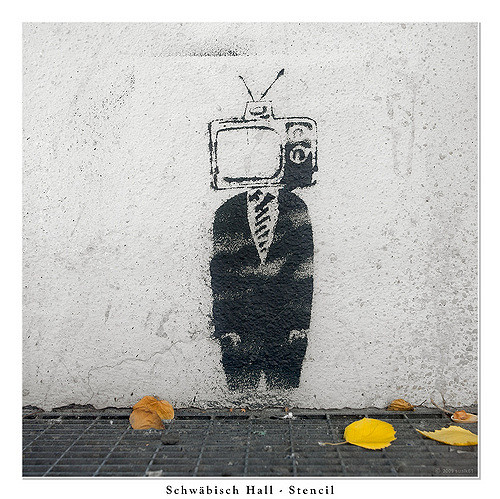
TV Man in the Autumn – photo past flickr user sualk61
For Charisse P., Television is a good coping mechanism: "if I'm having a bad 24-hour interval and a funny show is on, the laughter helps, it helps a lot."
The statistics in general do a slap-up task of making Telly sound horrible, but spend some time actually talking to people about why they watch, and you may find your viewpoint shifting. Frances T. of Oahu, HI is 38 and completed some college. She watches at least five hours of television a day, even though the balance of her family'southward in bed by 9pm. For her, TV is informative and keeps her tapped into what'south happening locally and nationally. It also helps expand her opinion on different topics, which she values. Sonja B. agrees: "I like shows that add something to my everyday life," she notes, adding that she prefers estimate shows because she finds them educational, and talk shows because they expose her to data she might not otherwise come beyond. Jamie Chiliad. likes watching documentaries considering she feels like she is learning something. Charisse P., 38, works with in-patient youth in a psychiatric facility in Birmingham, AL. She watches five or half dozen hours of TV a 24-hour interval, and finds it a good coping machinery: "if I'thousand having a bad twenty-four hours and a funny show is on, the laughter helps, it helps a lot."
Then at that place's the fact that, for many, watching tv is a meaningful social feel. Kawanda C. lives in New Orleans, where she doesn't have a machine. She'south 31 and didn't finish high schoolhouse. She works every bit a cashier, and spends a lot of time getting to and from work. She watches on boilerplate eight hours of Tv a day, and loves to watch with her kids. Sonja B. also opts for companionship when taking in her favorite shows: "It's always fun to watch Boob tube with someone else because they might accept a different perspective." Indeed, in contrast to to Bruni and Stanca's findings about goggle box crowding out social activeness, researcher Nele Simons's interviews with Goggle box watchers show that they socialize around the goggle box they scout. She even suggests that people watching tv at different times can create new opportunities for Boob tube and socializing. In Simons's telling, the classic mid-century meme of a traditional family unit of measurement gathered around to watch I Honey Lucy or the Ed Sullivan Evidence continues, simply today it's football at your uncle's place, or Game of Thrones at your corner dive bar.

Family unit watching television. Evert F. Baumgardner, ca. 1958 – from the National Archives and Records Assistants.
It does seem that qualitative methodologies tend to pigment a more positive movie of the furnishings of boob tube. A set of interviews with Dutch adults aged 65-92 published terminal year explored the question of whether their television viewing habits are more often office of a selection strategy–that is, a witting option made to maximize wellbeing–or a compensation strategy, a option that is made to fill time or otherwise compensate for some kind of loss or diminishment. While there were certainly examples of compensation strategies among their interviewees, the researchers more often found that people were watching Television with no regrets.
But the Telly-is-good-for-you case is more than anecdotal; in that location's a pocket-sized simply growing torso of quantitative research that paints a more than positive side to the medium likewise. Call back that our aforementioned analysis of the General Social Survey found that amid the lowest income quartile, which is too the segment that watches the about TV, more television is non associated with lower life satisfaction. 1 hypothesis to explain this comes from a paper by Bruno Southward. Frey et al. analyzing data from the European Social Survey. Frey et al. found that people with a lower opportunity cost of complimentary time, like unemployed people or those with very fixed working hours, were less likely to report decreased life satisfaction every bit their TV hours increment, while the opposite was true of individuals with a high opportunity price of their complimentary time. If people with lower incomes tend to have a lower opportunity cost of their free time, this might explain why tv set at the bottom income quartile does not seem to impairment life satisfaction.
While we haven't encountered inquiry showing positive furnishings of television content on adult viewers, there are some success stories for children and teens. In one study, researchers Kearney and Levine looked at the MTV franchise xvi and Meaning–a series of reality TV shows including the Teen Mom sequels–and determined that the shows ultimately led to a 5.7% reduction in teen births in the 18 months following their introduction, which is about one tertiary of the reduction in teen births during that period. In a follow-upwardly, Kearney and Levine found that preschoolers who lived in areas where they could sentinel Sesame Street were 14% less likely to fall behind when they got to elementary school, and that this effect was much more pronounced for kids who grew upward in areas with higher levels of economic disadvantage.
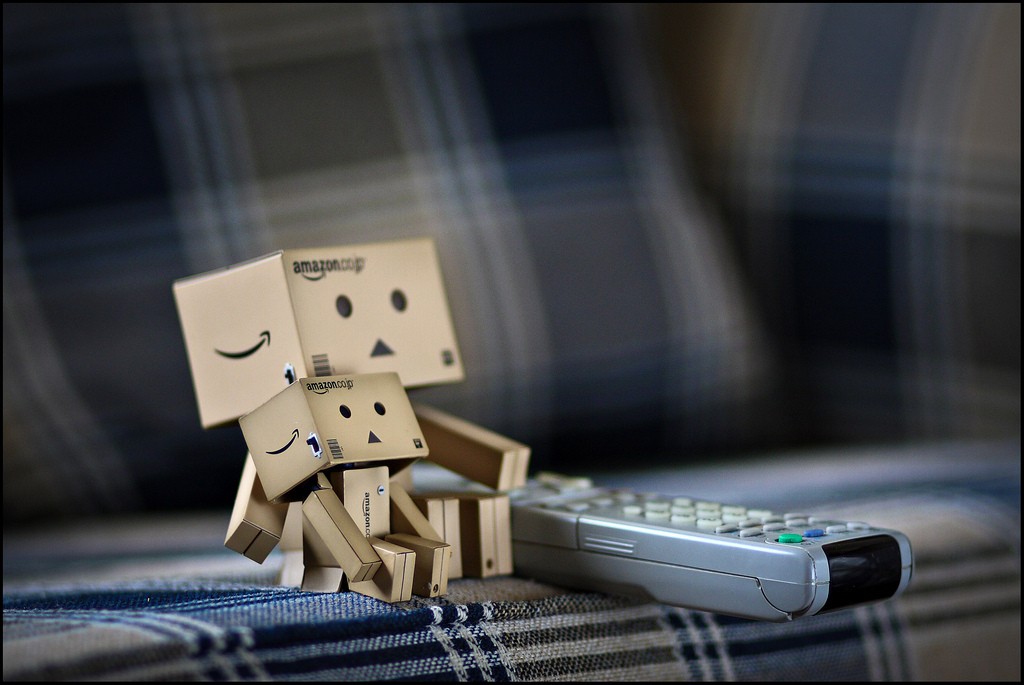
Goggle box time – photo past flickr user Blake Danger Bentley
I WILL CHOOSE Gratis WILL?
TV makes united states of america fat. It dumbs us down. Besides much TV makes us unhappy. Non enough TV makes u.s.a. unhappy. TV makes us laugh. It keeps usa informed. It keeps united states from more social activities. Information technology'south an opportunity for family fourth dimension. It's unsafe: for our feeling of self worth, for our chapters to empathise right from wrong. At the end of the 24-hour interval, there's plenty of bear witness to suggest that Boob tube is both good and bad for us, depending on who we are, how we define good and bad, and how we get about asking and answering the question.
To be sure, not all of this evidence is created equal. If nosotros were to pit the "Goggle box is good" and "TV is bad" hypotheses against each other in a competition of methodologies, bad would probably win out. But how bad is bad? What exactly is the threshold of show of harm that would warrant taking the position that Boob tube requires an intervention?
Here, the instance of junk food provides us with a useful comparing. The impact of junk food consumption on public health has generated plenty concern among reasonably-minded policy wonks to motivate multiple attempts at intervention by the land. And all the same fifty-fifty for junk food, that motion to alter behaviors has not come up without controversy. The FDA, under intense pressure from Congress (and the National Restaurant Clan) was forced to filibuster nation-broad implementation of menu labeling requirements until afterwards the upcoming Presidential elections. (NYC implemented these same rules in 2006, and it took a full ii years for them to become reality.) This past Nov, NYC passed a law requiring restaurants to betoken highly salted dishes; it was challenged immediately. Bloomberg's famous soda ban was struck downwardly, suffering from a backlash from the very people it was intended to help. Richmond, CA took a different approach, introducing a soda tax rather than a size limit, simply it, too, failed.
What's more, many of these well-meaning attempts to regulate the health of Americans don't seem to be working: menu labeling has not been shown to change eating habits (and at least one report suggests information technology leads to greater caloric intake.) Kids denied in-school vending machines often cease upward consuming extra junk food. 1 yr after Berkeley, CA became the first city in the US to successfully laissez passer a soda tax, a report of its effectiveness reveals that, as the price increment has been largely causeless by distributors, the intended effect on consumers is negligible.
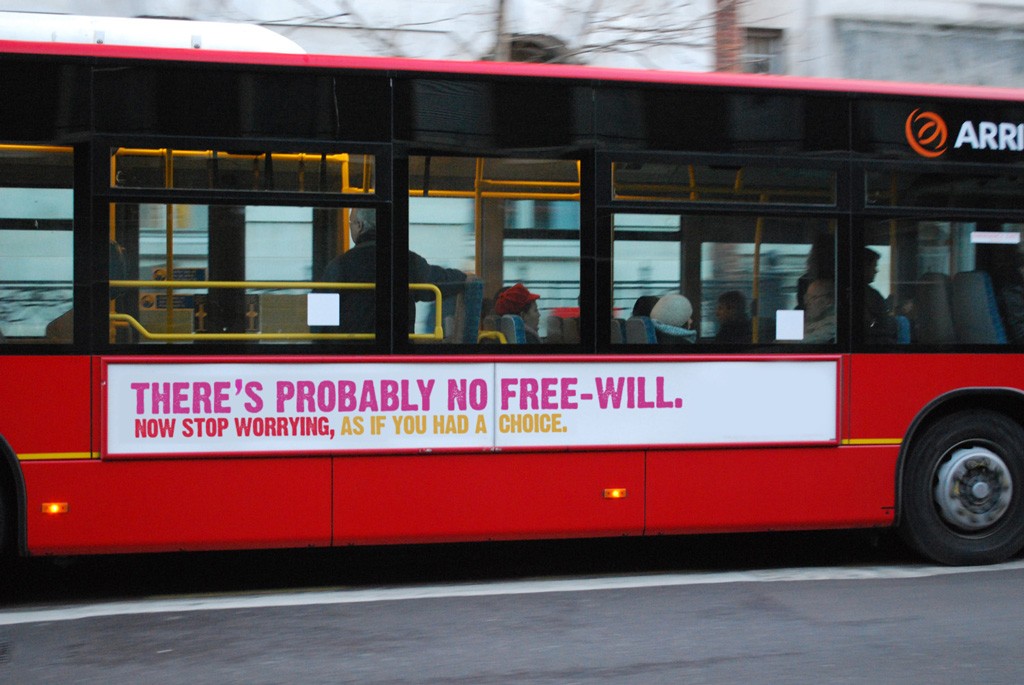
The no costless-will bus entrada – photo by flickr user Travis Morgan
Much as we might similar to believe otherwise, the arts are not some magical happiness-generating machine.
And so to return to our initial question: are people going to be worse off on average watching TV instead of engaging in other, potentially more than enriching, activities–similar attending arts events? It's hard to draw a definitive conclusion from the evidence, but in a style, that is its own conclusion. Much every bit we might like to believe otherwise, the arts are non some magical happiness-generating machine: our analysis of responses to the 2012 General Social Survey shows that people who attend arts exhibits and performances are no more probable to be satisfied with their lives than those who don't, later controlling for demographic and baseline characteristics. Meanwhile, Television receiver can provide many of the aesthetic pleasures that arts events are supposed to provide, normally at lower cost and with greater convenience. For Leslie B., a 40 year-one-time from Washington DC. who watches xv hours of Tv set daily, anime is the tiptop. She'south a photographer and wardrobe stylist, and takes inspiration from the mode the characters are drawn. Charisse P. emphasizes the demand for shows to take skilful storylines and strong characters. She'due south drawn to programs with lots of surprises. Shantell T. likes shows with good music, like Empire.
While there are certainly aspects of the effect of TV on physical, cognitive and subjective wellbeing that are concerning and deserve further exploration, given how dicey it is to seek to intervene in adults' choices, our instinct is to exercise caution. For us to motility forward in pursuing a instance for modify with respect to TV, nosotros would need to see clearer prove for an opportunity to improve wellbeing.
For us, the question of wellbeing ultimately comes downward to opportunity and choice. Our definition of a healthy arts ecosystem draws inspiration from the "capability approach," a widely adopted philosophical framework adult by Amartya Sen and Martha Nussbaum that defines wellbeing in terms of freedoms. Co-ordinate to the capability approach, whether or not people accept advantage of the opportunities they take, their capability to make decisions about how they pursue their lives is vital to wellbeing, and having the capability to attain diverse states is more important than whether or non one chooses to exercise that adequacy.
Frances T. talks about the impact of TV on her life
It seems similar a whole lot of people are making the selection to reach for the remote. For some, this undoubtedly isn't the best choice they could make. For others, maybe it is. And it's really hard for us, or anyone else, to tell the difference. Tempting every bit it might be to judge people who spend viii hours a day in front of the TV, many of u.s.a. spend that much time or more each day in front end of a different sort of modest screen. We can only promise that everyone who does so is as enthusiastic about it as Frances T., who confidently alleged when we asked her whether TV affects her wellbeing, "it is my own wellbeing to watch Boob tube."
Liked this commodity? 2 things. First, we'll be hosting a #CreatequityAsks Twitter conversation to discuss the implications of this piece of work on Wednesday, March 9 from 4-5pm Eastern fourth dimension. 2d, nosotros're conducting a reader poll to help the states determine what nosotros should investigate adjacent. Please take five minutes to share your opinions! Thanks so much.
Source: https://createquity.com/2016/02/are-the-arts-the-answer-to-our-tv-obsession/
0 Response to "Tv Is Better Than Ever Before but It Isnt Art"
Post a Comment